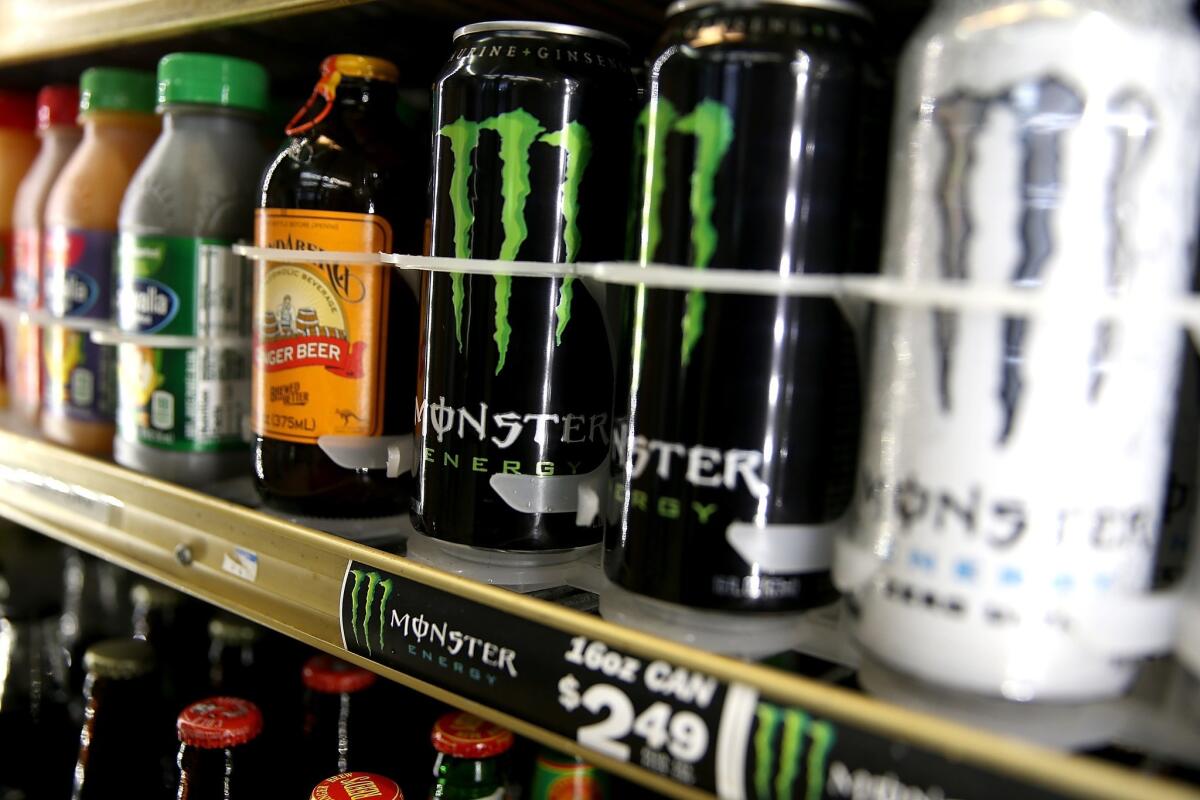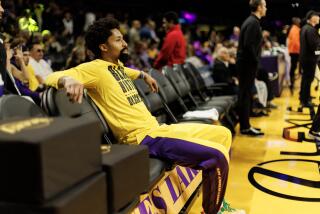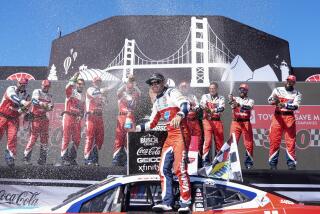Energy drink giant Monster will now sponsor NASCAR’s top racing series

The two leading players in the energy drink market, Red Bull and Monster, long have sponsored motor races and extreme sports events to help expand the market for their pumped-up beverages.
But Monster Beverage Corp. is hoping for a fresh sales jolt by taking it a step further: The company recently signed a multiyear deal to be the title sponsor of NASCAR stock-car racing’s top series, the nation’s most popular form of motor racing, starting this year.
The circuit had been known as NASCAR’s Sprint Cup Series, but the wireless company departed and Monster stepped in. The series will now be called the Monster Energy NASCAR Cup Series.
It’s the latest effort by Corona-based Monster not only to stay within striking distance of Red Bull for leadership in the $8.3-billion U.S. energy drink business but also to help offset a slowdown in the market’s overall sales growth.
“With a high-profile sport like NASCAR, it’s an evolutionary step for Monster to move up to the top echelon of motorsports sponsorship,” said Duane Stanford, editor of the trade journal Beverage Digest.
Energy drinks exploded in popularity starting more than a decade ago and Monster, once an obscure seller of fruit juices and sodas, exploited the trend with its Monster line of caffeine-laced drinks. Monster’s net sales in 2015 totaled $2.7 billion and its drinks are sold in 120 countries.
Mostly bought at convenience stores, the drinks are especially popular with young adults. Small wonder, then, that Red Bull and Monster invested heavily to sponsor extreme sports events, motorcycle racing and some individual teams and drivers in NASCAR, Formula One and other auto-racing series.
The drink makers “want to promote a fast lifestyle and living on the edge,” said Chrystalleni Stivaros, an analyst at the research firm IbisWorld. “They want their products to be cool.”
U.S. annual sales of energy drinks have more than tripled in the last decade, with privately held Red Bull of Austria maintaining a 38.3% share of the market, followed by Monster at 26.8% and Rockstar Energy Drink at 8%, according to IbisWorld.
But the market’s annual percentage growth rates have slowed from double to single digits. Growth is expected to average a more modest 3.1% a year over the next five years, Stivaros said.
That’s because the U.S. energy drink market has lost its novelty and become a mature business, and it now faces stiff competition from a plethora of caffeine-heavy coffees, teas and other beverages. “There are a lot of different ways people are finding their energy boost these days,” Stanford said.
Monster and Red Bull also have faced allegations that their drinks can be harmful, which they deny, but Stivaros said “consumers also are definitely wary about the health effects of consuming such a high content of sugar and caffeine together. That was not as relevant in the early 2000s.”
The slowdown can be seen in the stock price of Monster, which was named Hansen Natural Corp. until 2012.
In mid-2003, the stock traded for less than 50 cents a share (adjusted for splits since then). By mid-2015 it had skyrocketed to $44.50 a share, a spectacular increase that helped make Monster’s longtime chief executive, Rodney Sacks, a billionaire. His net worth currently is $1.3 billion, according to Forbes.
The stock has mostly treaded water in the last 18 months as the industry’s sales growth slowed; the stock closed Tuesday at $45.54 a share.
But analyst Kevin Grundy of investment firm Jefferies last month upgraded the shares to a “buy” in part because Monster’s sales have picked up in recent months.
During a conference call with analysts in November, Sacks was asked about the energy drink business going forward.
“[The] $64,000 question,” he replied. But he added that “it’s gone up and down in the past” and Monster expects “to see some increase in growth rates next year. But again, we don’t have any crystal ball to be able to do so.”
However, the company did have the cash to start making Monster nearly synonymous with NASCAR as a major new promotional campaign.
SIGN UP for the free California Inc. business newsletter »
“We feel strongly that our brand is a perfect fit for this sport and its star athletes,” Sacks said of NASCAR in a statement when Monster and the sanctioning body announced their pact Dec. 1. “We look forward to interacting with the millions of passionate NASCAR fans week in, week out.”
Sacks declined to be interviewed to elaborate. Red Bull also declined to comment.
Monster and NASCAR stand to benefit from their sponsorship deal, analysts said.
Monster already is the title sponsor of the AMA Supercross Series of stadium-style, off-road motorcycle racing. It’s also sponsored the cars of NASCAR racing brothers Kurt and Kyle Busch, among other drivers.
But as the title sponsor of NASCAR’s entire top series, it’s an opportunity for the company to spread its brand loyalty to millions of potential new customers, especially consumers ages 30 and older who are the bulk of NASCAR’s fans.
“We believe Monster views the sponsorship as a cost-effective medium to increase energy drink category penetration and brand awareness in the U.S.,” analyst Mark Astrachan of the investment firm Stifel Financial Corp. said in a note to clients.
Monster also snagged the deal at relatively attractive price.
Although terms of the deal were not disclosed, Monster is widely believed to have paid much less for its title sponsorship than the roughly $50 million that Sprint reportedly was paying annually at the end of its contract. Some analysts place Monster’s annual cost at $20 million to $30 million.
That’s due largely to a drop in NASCAR’s popularity from its peak about a decade ago. Stock car racing was severely hurt by the financial collapse of 2008-09 and the sport’s own missteps that alienated a chunk of its fan base, with both live attendance and television ratings falling in recent years.
Even so, NASCAR — with star drivers such as seven-time champion Jimmie Johnson and Dale Earnhardt Jr. — remains immensely popular. Each of its top-series races typically draw 50,000 spectators or more and often are a weekend’s most watched sporting event with several million TV viewers.
NASCAR also has pushed hard to be more accessible on mobile devices and via social media outlets so heavily favored by younger audiences. The sport also has an exceptionally long season that will keep Monster’s brand in the public eye from February to November.
Monster “will likely help boost NASCAR’s viewership, which has been declining in recent years, pulling in a new and younger consumer without losing NASCAR’s existing core audience,” Astrachan wrote.
That’s certainly NASCAR’s goal as it strives for more lifelong fans.
“We are thrilled to have a partner that will help us further elevate the series,” NASCAR Chairman Brian France said in a statement.
It’s an open question how much it will pay off for Monster. With Monster and Red Bull already having sponsored individual teams and drivers in NASCAR, it’s not as though the energy drinks have been invisible to the sport’s fans. But facing slower sales growth, Monster wants a much broader connection with fans of 200-mph race cars.
Monster not only will be mentioned millions of times each year as the title sponsor of NASCAR’s main series, but the drinks’ NASCAR ties probably will also be heavily promoted in convenience stores and other retail outlets where Monster wants to maintain or expand its shelf space.
Monster has one other asset: A partnership with soda giant Coca-Cola Co.
Coke paid $2.2 billion for 16.7% of Monster’s stock last year. As part of the transaction, Monster acquired Coke’s line of energy drinks while shifting its non-energy drinks to Coke. Monster also moved a major part of its U.S. distribution to Coke’s sprawling network of bottlers.
Add it up and for Monster “to have its name on this stage [with NASCAR] is a very big deal,” Stivaros said. “Brand promotion and development is paramount in this industry.”
For more business news, follow James F. Peltz on Twitter: @PeltzLATimes
MORE BUSINESS NEWS
‘Hidden Figures’ is likely to draw crowds as ‘Rogue One’ stays on top of the box office
Popular anchor Megyn Kelly will leave Fox News after 12 years to join NBC
In ‘vote of confidence’ for Trump, Ford cancels Mexico factory and will invest in Michigan
More to Read
Inside the business of entertainment
The Wide Shot brings you news, analysis and insights on everything from streaming wars to production — and what it all means for the future.
You may occasionally receive promotional content from the Los Angeles Times.











